

Imagine giving a work report presentation in front of your colleagues, one may stutter throughout the presentation and the other presents fluently without stuttering. However, the products from stress remains the same as it is a natural body response to pressure and it definitely affects one mentally, emotionally and physically.
Can one reduce stress and effectively cope with it?
Let us find out what are we dealing with.
Stress – APA Dictionary of Psychology. N. 1. the physiological or psychological response to internal or external stressors.
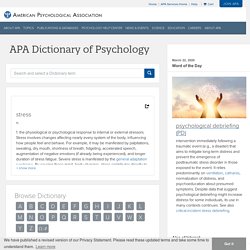
Stress involves changes affecting nearly every system of the body, influencing how people feel and behave. 562The Management of Stress 2. Eustress, distress, and interpretation in occupational stress. What is Eustress? What is Distress? Factsheets of Stress. Two Types of Stress. Edwardsetal1998. Edwards1998. Theories of Organizational Stress - Google Books. Summary of weblinks.
Three models of an Occupation Stress. (1) Person-environment fit theory (Edwards et al., 199😎. Whether the character of the individual and environment is in sync. (2) Cybernetic theory (Cummings and Cooper, 199😎. Whether the individual is able to adapt and accept what is going on. (3) Control theory (Spector, 199😎. Whether the individual is able to control the variables which has potential to cause stress in their working environment, – bennypeh
Coping one day and crying the next: Work-related burnout is real. SINGAPORE: One day at work, Ms Jamuna Raj was striking off “to-dos” from a neat hand-written list, thinking she had a lid on all her tasks at work.
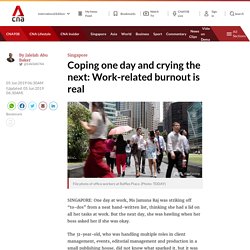
But the next day, she was bawling when her boss asked her if she was okay. The 31-year-old, who was handling multiple roles in client management, events, editorial management and production in a small publishing house, did not know what sparked it, but it was the start of her journey towards realising that she was experiencing burnout. “I was striking the to-dos off, but for every one that I did, there were five more. Still, because I was striking things out, I thought I could handle it,” she told CNA. At the time, she had multiple deadlines looming ahead of her. Her boss had checked on her because she had changed and her colleagues noticed it, said Ms Jamuna, a Singaporean who lives in Melbourne.
“As soon as he (her boss) asked me that, I started bawling. READ: Commentary: What’s behind burnout? “I went back, and I saw my emails, I cried. TODAYonline. SINGAPORE — One in seven people in Singapore have experienced a mental disorder such as bipolar disorder or alcohol abuse in their lifetime, an increase from roughly one in eight several years ago. The top three mental disorders here were major depressive disorder, alcohol abuse and obsessive compulsive disorder. This is based on the finding of the second Singapore Mental Health Study, which started in 2016 and involved interviews with 6,126 Singaporeans and permanent residents. Read also Gen Y Speaks: What caring for my mum taught me about mental illness The lifetime prevalence of 13.9 per cent in 2016 marked an increase from 12 per cent in 2010, when the first study was conducted.
Depression was the most common mental disorder, with one in 16 people in Singapore having the condition at some point in their lives. One in 24 people experienced alcohol abuse, while one in 28 people suffered from obsessive compulsive disorder. But those who had sought help were doing so earlier. A whopping 92% of working Singaporeans are stressed – and women are prioritising families over themselves, study finds, Business Insider - Business Insider Singapore. Pexels If you’re feeling stressed at work, you’re not alone.
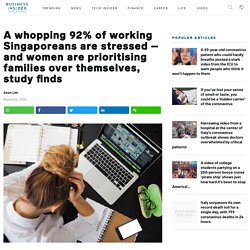
A vast majority of working Singaporeans are under stress, and women in particular feel that it’s less manageable, a survey has found. In the 2019 Cigna 360 Well-Being Survey, a whopping 92 per cent of working Singaporeans report feeling stressed, higher than the global average of 84 per cent. Of this, 13 per cent say their stress is unmanageable, which is on par with the global average, according to the study which surveyed a total of 13,200 online interviews in 23 markets, including 502 residents in Singapore.
And stress doesn’t go undetected in the workplace. Read also: 6 in 10 Singaporeans admit that they don’t leave work on time just to ‘show face’ Noticing colleagues’ stress in turn makes respondents more self-aware, it seems. 30 per cent of respondents feel more conscious about managing their own stress upon seeing others stressed at work. Women prioritise families over themselves. 160,000 Singaporeans hospitalised from stress every year, with over 14 million stress-related doctor visits: report, Business Insider - Business Insider Singapore. Stress effects on the body.
Musculoskeletal system When the body is stressed, muscles tense up.
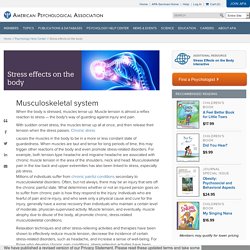
Muscle tension is almost a reflex reaction to stress — the body's way of guarding against injury and pain. With sudden onset stress, the muscles tense up all at once, and then release their tension when the stress passes. Chronic stress causes the muscles in the body to be in a more or less constant state of guardedness. Millions of individuals suffer from chronic painful conditions secondary to musculoskeletal disorders. Relaxation techniques and other stress-relieving activities and therapies have been shown to effectively reduce muscle tension, decrease the incidence of certain stress-related disorders, such as headache, and increase a sense of well-being. Respiratory system The respiratory system supplies oxygen to cells and removes carbon dioxide waste from the body. Some studies show that an acute stress — such as the death of a loved one — can actually trigger asthma attacks.
Cardiovascular Endocrine The HPA axis. Stress: Signs, Symptoms, Management & Prevention. What is stress?
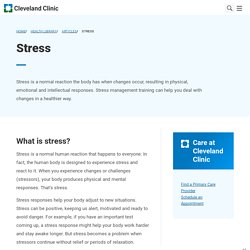
Stress is the body's reaction to any change that requires an adjustment or response. The body reacts to these changes with physical, mental, and emotional responses. Stress is a normal part of life.